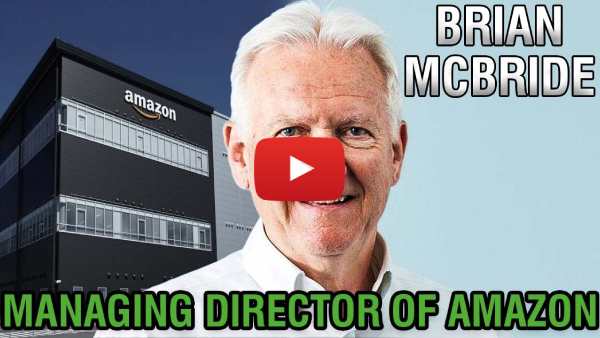10 Key Tips to Grow & Scale Your Business in 2026

In today's rapidly evolving business landscape, growth and scaling are not just ambitions but necessities. A staggering eight out of ten CEOs now prioritise new-business building amidst economic volatility, a McKinsey survey reveals. Astonishingly, companies are launching 50% more new ventures annually compared to the last two to five years. These ventures aren't just revenue generators; they create nearly double the enterprise value per dollar compared to traditional core business revenues. As business leaders plan to increase their new business investment, it's clear that rapid business building is vital. Growth and scaling strategies are crucial in an era where new businesses are expected to contribute 29% of total revenue by 2027 and are already creating substantial economic impact globally and in the UK.
Here at The Motivational Speakers Agency, our expert Director, Jack Hayes, has collected his expertise on the 10 key tips to grow and scale your business – drawing on his countless years of experience in growing and scaling business in the global keynote speaking industry. Prepare to unlock the secrets to scaling your business, fuelling productivity and driving unprecedented growth, below.
Source: McKinsey & Co, Royal Bank of Scotland
Contents:
- What is business growth and scale?
- How can I generate growth and scale in business?
- Why is growth and scale important in business?
- How can a business speaker promote growth and scale?
What is Business Growth & Scale?
Business growth involves increasing a company's revenue and market presence, while scaling is the ability to boost revenue at a faster rate than costs. Scaling involves strategies like adopting new technologies and streamlining operations to add revenue and manage operational demands without proportionally increasing costs, aligning with the original business vision.
Source: ExpenseIn
How Can I Generate Growth & Scale in Business?
The 10 Key Tips to Grow & Scale Business in 2026
1.) Look at ways to increase sales to both existing customers and new customers:
Exploring methods to enhance sales for both existing and new customers is a pivotal strategy for business growth and scaling. Diversifying offerings by identifying new products or services through market research, or innovatively presenting existing products, such as through subscriptions or bundles, attracts new clientele. Focusing on existing customers, perhaps by converting one-time buyers into repeat customers, re-engaging past customers or selling more to regulars, is often more cost-effective than acquiring new ones. Maintaining a customer database aids in targeting these groups effectively.
Even minor changes, like introducing loyalty schemes or bulk discounts, can enhance sales to both new and existing clients - with a reported 84% of consumers more likely to stick with a brand that offers a loyalty programme. It’s vital, however, to balance the potential increase in sales volume against overall profitability, as discounts might lower profits and price hikes could reduce the number of items sold. Regular competitor price checks ensure the business remains competitive without undercutting its profitability.

”Business is about selling and understanding that can be the difference between success and failure." - Piers Linney
2.) Develop new products or services to reach new or existing markets:
Developing new products or services and targeting new or existing markets is a key strategy for business growth. This approach not only taps into the potential of your current customer base but also opens doors to new customers, enhancing market share and profitability. By carefully researching and understanding customer needs, businesses can innovate effectively. Creating prototypes and conducting thorough market testing ensures that the new offerings meet real demands and have a viable market.
This strategy can differentiate a business from competitors and add value to what it already offers. Furthermore, exploring avenues like franchising or exporting expands the business's reach, exposing it to a global customer base. This not only diversifies the revenue streams but also mitigates risks associated with relying on a single market. In essence, developing new products or services for diverse markets is a proactive way to adapt, compete and grow in an ever-evolving business landscape.
Source: ResearchGate
3.) Invest in recruitment:
Investing in recruitment and hiring top-tier talent is essential for driving business growth and scaling effectively. Having the right team is crucial for rapid expansion - skilled, dedicated employees not only contribute to the immediate success of the business but also foster a culture of innovation and competitiveness, key factors for long-term growth. Employees who are adaptable and growth-oriented are invaluable as they help the company navigate and thrive in dynamic market conditions. Although recruiting exceptional talent requires an upfront investment, the long-term value and competitive edge they bring significantly outweigh these initial costs, making it a wise strategy for sustainable business success. Additionally, when employers have built a strong workforce, they can increase their talent pool x10 by recruiting through their employee network.

“When you’re building a business you can’t carry anybody, there is no space to carry anybody. The people who got you here, won’t necessarily get you there. And so you’re always looking for people around you who bring energy, who bring the ideas, who bring the next stage of thinking.” - Kevin Gaskell
4.) Increase customer retention:
Increasing customer retention is a powerful strategy for achieving business growth and scalability. It's much more cost-effective to retain existing customers than to acquire new ones, and returning customers are reported to spend 67% more than new customers. Fostering customer loyalty not only enhances sales but also establishes a stable revenue base. Effective strategies for boosting retention include prioritising excellent customer service, as satisfied customers are more likely to remain loyal and supportive. Utilising a Customer Relationship Management (CRM) system can help manage and analyse customer interactions, leading to better service and sales opportunities. Implementing a customer loyalty program can further incentivize repeat business. Additionally, engaging through regular email campaigns and social media interactions ensures your business remains at the forefront of customers' minds, and keeping promises cements their trust in your brand. Overall, a focus on customer retention is not just a cost-saving measure but a cornerstone for sustainable growth and market competitiveness.
5.) Promote staff training:
Promoting staff training is a vital catalyst for business growth and scalability. By investing in the professional development of employees, businesses can enhance their adaptability to ever-changing market conditions and internal company dynamics. Training broadens the range of skills within the workforce, fostering both employee loyalty and increased productivity, which directly translates to heightened profitability. High-performing individuals often prioritise development opportunities over salary and benefits, with 74% of workers willing to learn new skills to remain employable, seeking challenges and the chance to expand their skills. Cultivating a culture of continuous learning and professional growth not only attracts ambitious talent but also retains them by offering a clear pathway for career advancement and personal development.
In an era where industry standards are continuously evolving, staying relevant and innovative is crucial. Employee training introduces new perspectives, innovative strategies, and an understanding of the latest technological trends. This empowers employees to bring innovative ideas to their roles, keeping the company at the forefront of its industry. Professional development is no longer just an additional benefit; it's a necessity for a thriving workforce. This approach ensures that a business is equipped with knowledgeable, motivated and skilled employees, essential for driving growth and successfully scaling operations.
6.) Focus on customer experience:
Focusing on customer experience is a key driver for business growth, a strategy known as "experience-led growth." Superior customer service can significantly enhance a company's reputation, leading to word-of-mouth referrals and increased customer loyalty - with Survicate reporting that companies with a customer experience mindset drive revenue 4-8% higher than the rest of their industry. When a business consistently exceeds customer expectations, it not only retains existing clients but also attracts new ones. This might involve going above and beyond, such as offering discounts for any inconvenience or diligently following up to ensure customer satisfaction. Implementing this strategy requires a comprehensive approach: defining financial goals, prioritising customer experience improvements that align with these objectives, transforming corporate culture and operating models, accelerating innovation and technology adoption and developing advanced customer experience metrics and analytics. In some cases, it might even necessitate redefining the company's core mission. By adopting this holistic approach, businesses can create a customer-centric environment that drives sustainable growth and strengthens their market position.

“Firstly I think you have to have patience, I think you have to grind it out. If you expect a quick fix, you can’t expect consumers in our market and the FMCG world to change habits quickly…” - Jonathan Warburton
7.) Adopt and invest in emerging technologies:
Investing in the latest technology is a cornerstone for driving business growth and scalability. In today's digital era, technological advancements have revolutionised how we conduct business, making processes more efficient and effective - with over 70% of companies either having a digital transformation strategy in place or working on one. By embracing cutting-edge technology, companies can streamline tasks, eliminate redundancies and significantly boost productivity, paving the way for expansion. Implementing advanced systems in key areas such as customer relationship management (CRM), marketing automation, sales management, inventory management, manufacturing, accounting, human resources (HR) and shipping can transform how a business operates. This proactive approach to technology adoption addresses workload and productivity challenges, enabling businesses to operate more efficiently, respond more quickly to market changes and maintain a competitive edge. In essence, investing in modern technology is not just an enhancement to existing operations; it's a strategic move essential for growth and long-term success.

“If you are selling directly to consumers and you’re not using digital today, I think you may not be around in the next couple of years.” - Brian McBride
8.) Prioritise sustainability:
Prioritising sustainability is a key strategy for fostering business growth and resilience. By focusing on long-term environmental responsibility, companies cultivate an innovative culture that ensures the sustainability of their operations. This approach goes beyond mere declarations of intent; it involves demonstrating a commitment to sustainability through concrete actions. Embracing eco-friendly practices and solutions that benefit both people and the planet establishes a company as a responsible leader in its industry. This not only appeals to a growing base of environmentally conscious consumers, with 49% of consumers now stating they would pay a premium for sustainable products or services, but also positions the business for enduring success. A sustainable approach often leads to efficiency improvements, cost savings and enhanced brand reputation, all of which are critical drivers of business growth and competitive advantage in the modern marketplace.

“Take people on a journey with you and really invest in the team around you. I think good business leaders are happy to share everything they know…” - Jo Fairley
9.) Attend networking events:
Attending networking events and forging strategic partnerships are vital for stimulating business growth. These partnerships can significantly extend a company's customer reach and boost revenue. Aligning with another business, whether it's for customer expansion or vendor relationships, can align with and enhance strategic business objectives. Networking events serve as a crucial platform for connecting with industry peers, offering access to unique perspectives, insights and valuable experiences. These interactions can lead to long-lasting professional relationships, providing opportunities to learn, share challenges and access a broader network of industry professionals. Such connections can be instrumental in addressing current business needs and uncovering new growth opportunities. In essence, strategic partnerships and networking are not just about expanding contacts but are strategic tools for business expansion and long-term success.
“Being a CEO is the best job in the world and don’t let anyone tell you any different… You’re completely absorbed in it and you meet such a wide variety of people; every day is different.” - Gareth Davis
10.) Increase focus on social media:
Focusing on social media is an effective strategy for driving business growth and scalability. By establishing and maintaining active profiles on major platforms like Instagram, Facebook and Twitter, businesses significantly enhance their marketing reach - with Forbes reporting that over 70% of businesses rely on social media for customer engagement. These platforms provide a direct line of communication to a vast audience of potential customers. Regular updates and engagement on these platforms make it easier for consumers to discover and interact with your business. This visibility increases the likelihood of customers sharing your brand with their network, amplifying reach organically. Moreover, a dynamic social media presence fosters a more engaging and relatable brand experience, building trust and loyalty among the audience. In the digital age, social media is not just a marketing tool; it's a pivotal component for expanding brand presence and cultivating lasting customer relationships.
Source: GOV.UK, The Hartford Business Owner’s Playbook, Business News Daily, Noble Futures, Faster Capital, Forbes, McKinsey & Co
Why is Growth & Scale Important in Business?
Growth and scaling are essential in business as they enable long-term sustainability and market competitiveness. Growth expands a business's reach and customer base, increasing revenue potential. Scaling, meanwhile, involves increasing the business capacity efficiently and maintaining or improving profit margins as the business grows. Together, they facilitate a company's ability to innovate, attract and retain top talent and adapt to market changes. Effective growth and scaling strategies, like enhancing customer experience, adopting new technologies and developing strategic partnerships, are crucial for staying relevant and successful in a dynamic business environment. Essentially, they are key drivers for a business's resilience, profitability and continuous development.
How Can a Business Speaker Promote Growth & Scale?
A business speaker can inspire growth and scale by sharing innovative ideas, success stories and practical strategies. Their expertise and experience can motivate entrepreneurs to embrace new challenges, think creatively and pursue strategic growth opportunities – igniting growth and scale in business. Such speakers often provide valuable insights that spark change and drive business evolution.
If you are interested in hiring a business speaker who could inspire growth in your organisation, browse The Motivational Speakers Agency’s roster of decorated business speakers and contact us today to discuss your options! Call 0207 0787 876 or complete our online contact form to discuss the prospects of a business speaker today.
This official article on the 10 Key Tips to Grow & Scale Your Business in 2026 was written by Jack Hayes.







